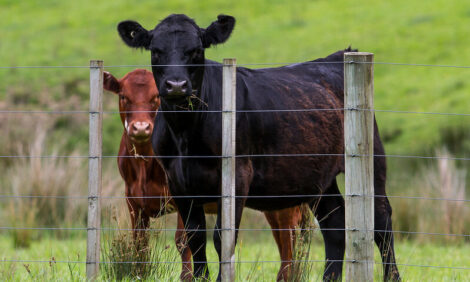



Dairy organizations offer statement on HPAI in cows
Statement from the National Milk Producers Federation (NMPF), the International Dairy Foods Association (IDFA), the U.S. Dairy Export Council (USDEC), and Dairy Management Inc. (DMI)Earlier this week, the U.S. Department of Agriculture confirmed highly pathogenic avian influenza (HPAI) in two dairy cattle herds in Texas and two herds in Kansas.
Importantly, USDA confirmed that there is no threat to human health and milk and dairy products remain safe to consume. Pasteurization (high heat treatment) kills harmful microbes and pathogens in milk, including the influenza virus.
Also, routine testing and well-established protocols for U.S. dairy will continue to ensure that only safe milk enters the food supply. In keeping with the federal Grade “A” Pasteurized Milk Ordinance (PMO), milk from sick cows must be collected separately and is not allowed to enter the food supply chain. This means affected dairy cows are segregated, as is normal practice with any animal health concern, and their milk does not enter the food supply.
Consumers in the United States and around the world can remain confident in the safety and quality of U.S. dairy.
About the illness in Cows
Dairy producers with affected cows are reporting a rapid onset illness in herds, specifically among older, lactating cows. Clinical signs include:
- Decreased herd level milk production
- Acute sudden drop in production
- Decrease in feed consumption
- Abnormal feces and some fever
- Older cows may be more likely to be severely impacted than younger cows
According to dairy farmers and veterinarians reporting on affected herds, most affected cows recover within two to three weeks.
Producers who believe dairy cattle within their herd are showing the clinical signs described above should report these signs immediately to their state veterinarian. Animals may also be reported to APHIS' toll-free number at 1-866-536-7593.
Enhanced biosecurity protocols underway on US dairies
As information related to an illness affecting dairy cows in several states began to circulate over the past two weeks, USDA’s Animal and Plant Health Inspection Service (APHIS) worked with state veterinary authorities as well as federal partners including the FDA to swiftly identify and respond to detections and mitigate the virus’ impact on U.S. dairy production. Dairy farmers also have begun implementing enhanced biosecurity protocols on their farms, limiting the amount of traffic into and out of their properties and restricting visits to employees and essential personnel. Avian influenza is an animal health issue, not a human health concern. Importantly, mammals including cows do not spread avian influenza—it requires birds as the vector of transmission and it’s extremely rare for the virus to affect humans because most people will never have direct and prolonged contact with an infected bird, especially on a dairy farm. As a precaution, dairy farmers are taking important measures to protect their workers.
The National Dairy FARM Program (NDFP) offers several valuable biosecurity resources providing dairy farmers with tools to keep their cattle and dairy businesses safe, including:
- Everyday Biosecurity Reference Manual
- Enhanced Biosecurity Prep Guide
- Herd Health Plan Protocol Template – Biosecurity
- Animal Movement Log
- People Entry Log
Biosecurity practices guidance is available here.
Dairy farmers who observe clinical signs in their herd consistent with this outbreak, such as a significant loss of animal appetite and rumination or an acute drop in milk production, should immediately contact their veterinarian. Veterinarians who observe these clinical signs and have ruled out other diagnoses on a client’s farm should contact the state veterinarian and plan to submit a complete set of samples to be tested at a diagnostic laboratory.
What is pasteurization?
Pasteurization is a process that kills harmful bacteria and pathogens, including viruses, by heating milk to a specific temperature for a set period of time. The processing of milk products involves pasteurization of the raw milk to a minimum of 161.5˚F for 15 seconds and then immediately cooling it. Ultra pasteurization is a process that heats milk at a higher temperature for specified times to extend a product’s shelf life.
What is avian influenza?
Detections of avian influenza in birds, including chickens, are common in the United States in the spring and fall due to wild birds spreading the virus as they migrate to and from their seasonal homes. While it is uncommon for Highly Pathogenic Avian Influenza to affect dairy cows, USDA APHIS has been tracking detections of HPAI in mammals for many years in the United States, leading dairy farmers and veterinarians in the United States to prepare for this eventuality. As a result, dairy farmers have taken immediate measures to enhance biosecurity measures in and around dairy farms to keep the food supply safe.
Trade and Exports
The U.S. dairy industry will continue to work with the US federal government, trading partners and the World Organization for Animal Health (WOAH) to encourage adherence to WOAH standards and minimize all unnecessary or unfair trade impacts. It is essential that trading partners do not impose bans or restrictions on the international trade of dairy commodities in response to these and future notifications and rely on the science-based food safety steps taken in US dairy processing, namely pasteurization, in preserving market access.


